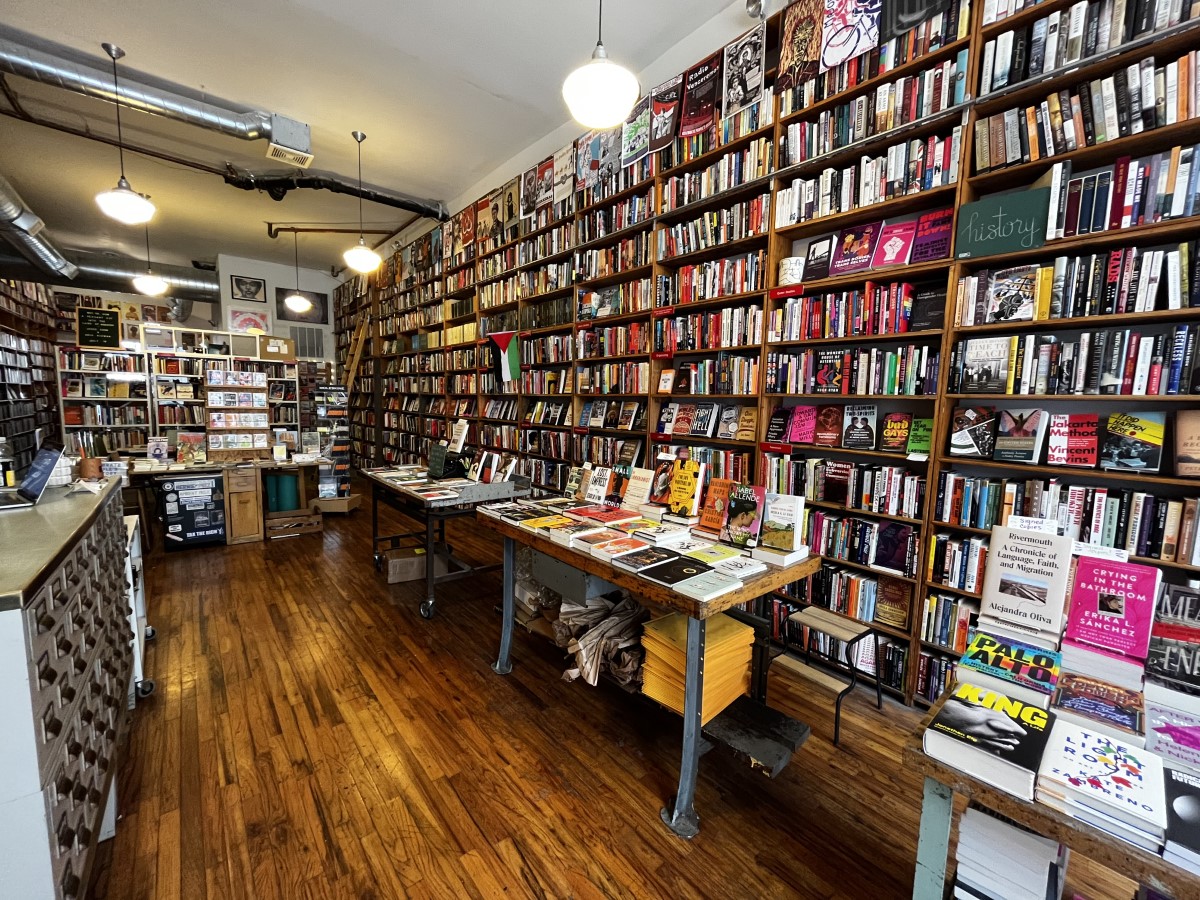Book store enthusiasts will often judge a store each by their own set of criteria, which could include anything from what authors are represented on the shelves to whether or not the poetry section is large enough to whether a children’s section exists. A question on the top of my list is: how is the store organized? Or more specifically, how are the books categorized and where in the store do they inhabit relative to the entrypoint? This says everything about first impressions. It is no surprise that most book stores will show you their fiction first since studies have shown that fiction occupies the biggest market. And although Pilsen Community Books (PCB) does have a massive wall of books dedicated to fiction, they lead with their politics.
PCB is much more than just your average labyrinthine local indie where you can get lost for hours on end. It is a space where books are used as a medium to build political community. Retail simply paves the way for this by keeping the lights on.
Upon entering the store, a Palestinian flag is dropped like a banner against the window above the door. The afternoon sun shines perfectly on their multi-colored motto hanging from a wall closest to the window—“always carry a book,” or ACAB for short. It’s a cheeky double entendre that signals safety for those who believe a world beyond carceral solutions is possible.
I am greeted first by the new releases tables. The first one displays books on policing, surveillance, and technofascism, and another with books on Palestine and by Palestinian authors such as the famed novelist and politician Ghassan Kanafani. Behind these tables are carefully curated floor-to-ceiling shelves, repurposed from high school bleachers, organized into sections of history, politics, and theory. These include, “History of Turtle Island/so-called “United States””, “Reproductive Justice”, “Queer Studies”, “Labor”, “Anti-colonialism, Anti-imperialism, & Anti-war (or Death to Empire!)”, and others.
When I asked worker-owner Mandy Medley about the power books have to facilitate political community, she told me that books are simply another form of ideas, and ideas compel people towards discussion. “It gives people an excuse to talk to one another.” This is not unlike many of the conversations I’ve struck with worker-owners at PCB and is how I’ve gone from browser to neighbor to friend with each worker at the store. Many of my conversations began with, “so what are you reading?”
It is common for these questions to spill over into larger conversations, some of which involve dialoguing fiction with reality: how does Octavia Butler’s “Parable of the Talents” mirror our current world and what lessons can we take away? Others involve manifesting future possibilities: how does one write towards freedom? PCB believes that because books explore the nuances of ideas, they have the power to slow us down, allowing us to closely examine and consider the questions presented to us.
“So books kind of, if you actually read the book, it forces you to sit with an idea for much longer than liking something on social media,” said Medley.
Many such conversations have led to invites to an event being hosted at the store. In addition to author talks, PCB’s endless queue of events include teach-ins and art-builds from grassroots organizing communities such as Friends of Congo, Stop Cop City, and numerous autonomous groups fighting for a free Palestine. In this way, PCB is not a place of constant beginnings or a revolving door of icebreakers — it is a place where introductory exchanges continue, bonds are created, and ideas are forged. Amidst a theater of towering books, strangers become comrades and comrades become community.
“We learn so much from the community and from people who want to put on events. The world is changing so quickly and all the things that the left has tried before have not worked. So we have to find new ways, right? And not just new ways of doing things but new ways of looking at things. That doesn’t happen unless we talk to one another,” said Medley.
PCB wants more than just to put readers in proximity to political books, it wants to carve out a corner in the city where folks who have already been dreaming of a world beyond our current systems can come and build that world together. More than a political space, it is a place of safety, experimentation, honesty, connection, even failure — a political home. Medley said that for those who might find themselves politically “orphaned,” it becomes “a space where people can come and find their people.”
It has certainly been that for me.
Pilsen Community Books, 1102 W 18th St. Mondays–Wednesdays and Fridays, 11am–7pm; store closes at 4pm, 5pm, and 6pm on Thursdays, Sundays, and Saturdays, respectively. (312) 478-9434, pilsencommunitybooks.com

